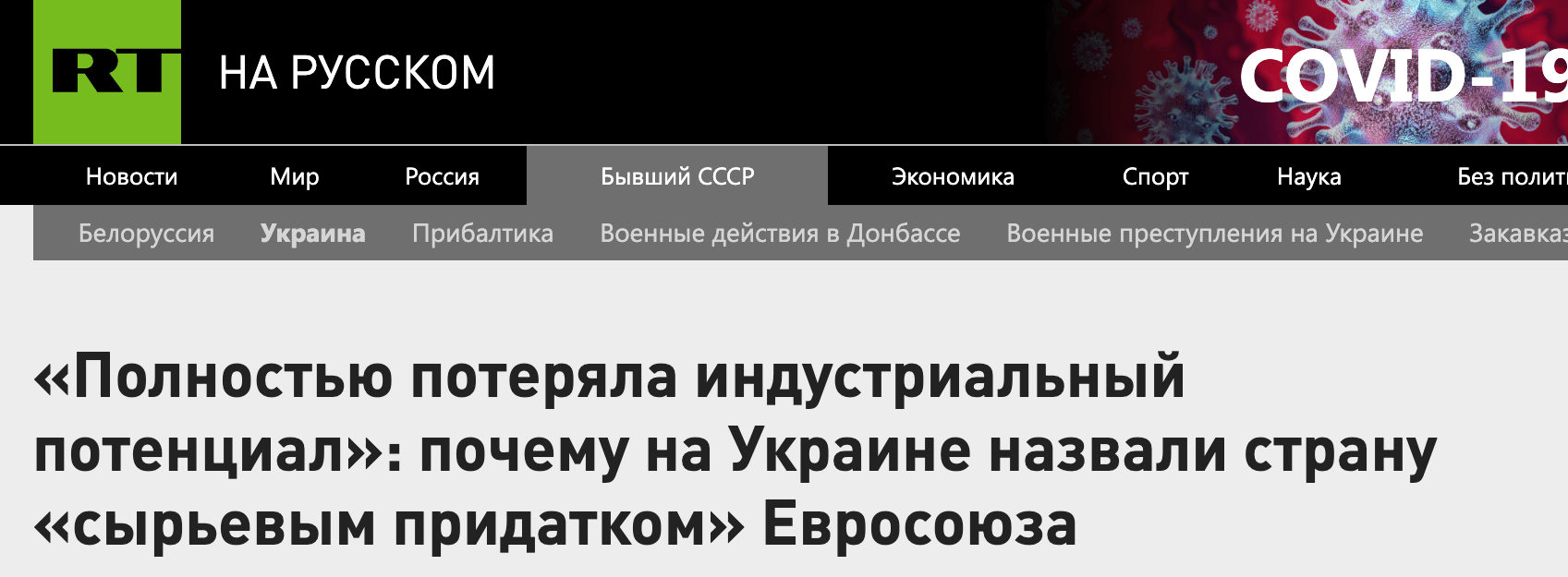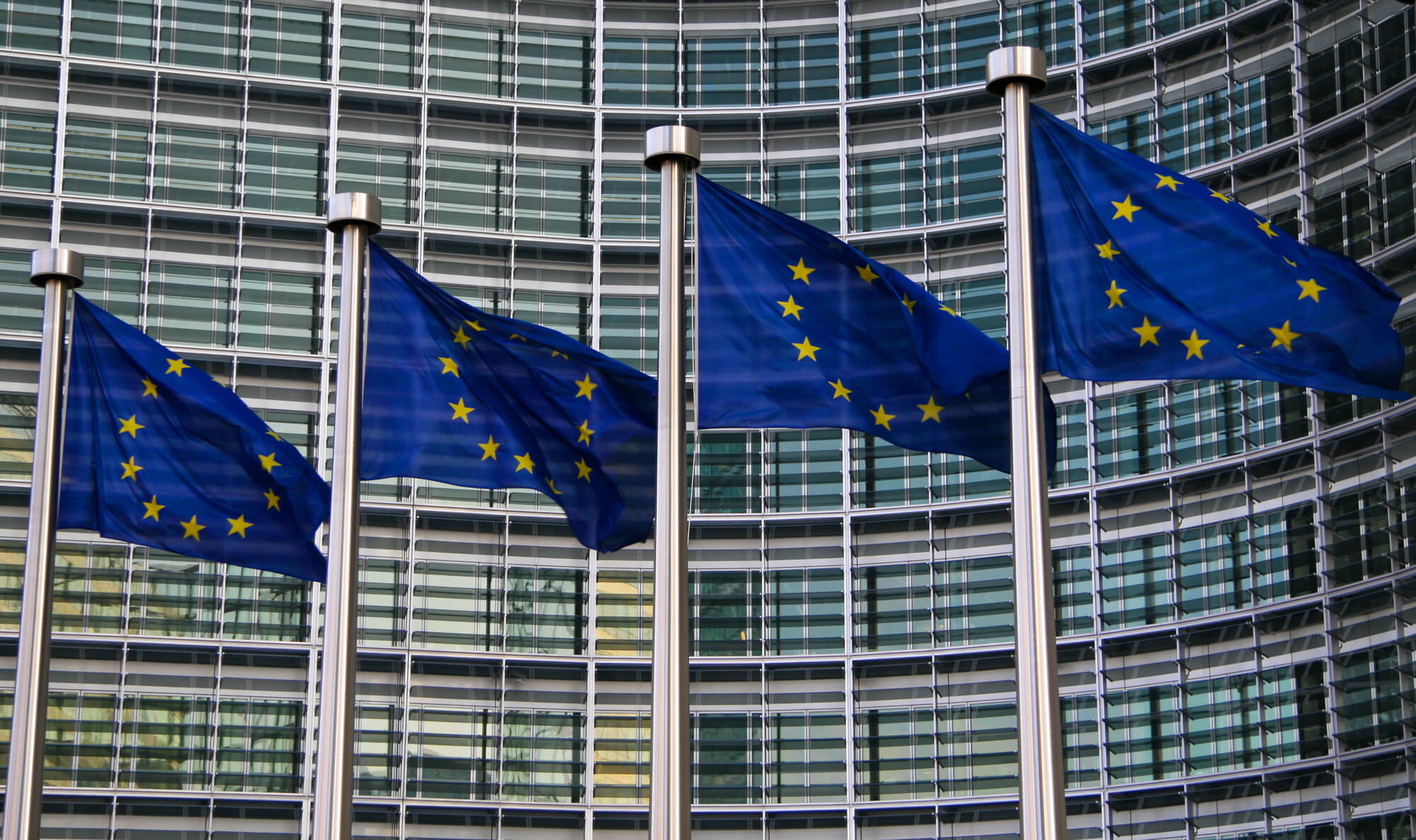7 years ago on September 16, 2014, the Association Agreement between Ukraine and the EU was ratified. The Agreement is mainly about trade, economic and sector cooperation. The document provided for the creation of a deep and comprehensive free trade area between the European Union and Ukraine. Upon the Agreement’s entry into force, the EU became Ukraine’s main trading partner, replacing Russia. This marked the end of Russia’s economic dominance in Ukraine.
These changes, as well as Ukraine’s pursuit of rapprochement with Europe, could not be to Russia’s liking. The Russian Federation has been trying to disrupt the association process since 2013. At the time, they talked about threats to the economy. It was feared in Russia that cheap and high-quality European goods would enter Russia via Ukraine. And that the new EU technical standards would squeeze Russian manufacturers from the Ukrainian market.
However, geopolitical motives most likely worried Moscow way more than economic ones. Putin complained in 2014 that Ukraine’s free trade with the EU threatened Russia with a loss of about USD 3 billion. But already in 2015, Russian authorities admitted that Western sanctions cost their economy USD 50 billion. Military aggression against Ukraine turned out far more unprofitable than the Association Agreement. Today, Russia is trying to maintain political influence in Ukraine. That is why, among other things, it launched a campaign to discredit the Agreement with the EU.
VoxCheck debunks the five most common myths of Russian disinformation about the Association.
Myth 1: Ukraine will never become a full EU member
”Russia explained the impossibility of Ukraine’s entering the EU and NATO”, ”Willing to enter but it won’t”, ”A failed project: why joining the EU remains an unattainable dream for Ukraine,” Russian media outlets write. The main message is that no one is waiting for Ukraine in the EU: the member states are against or sceptical about this chance.
Screenshot: Russian state television company Russia Today
“There’s no talk about any real chances”: How Ukraine is striving to enter the EU
Source: Russia’s Federal News Agency. It is associated with the Olgino Troll Factory disseminating disinformation, including about Ukraine.
Political expert Ishchenko: Ukraine will never join the EU
Lenta.ru writes: “Political experts note that the course towards the EU, for the sake of which Kyiv severed relations with Russia in 2014, does not benefit the country either”. Pro-Kremlin media are like saying, “See what happens if you give up “friendship” with Russia”. Another propaganda narrative is that the EU does not need a strong and independent Ukraine but a weak country bordering Russia that could be used for their own purposes.
In reality, none of the leaders of the EU member states or representatives of the EU political leadership has ever stated that Ukraine will never be able to become an EU member. There are indeed pessimistic predictions about how quickly this will happen. For example, Estonian President Kersti Kaljulaid said that Ukraine needs 20 years of work to join the EU. However, the European Union has never officially ruled out the possibility of Ukraine’s gaining full membership. The main criterion for this is reform. Russian media either distort the meaning of Western politicians’ statements or refer to anonymous sources that allegedly give similar predictions.
Myth 2: The association benefits only the European Union, not Ukraine
Interestingly, this myth directly contradicts the previous one: if Ukraine is good for the EU, why is “nobody waiting for it” there?
Russian websites spread manipulative information saying that the Agreement only benefits the European side and that Ukraine has not been granted access to the European market and lost the EurAsEC (Economic Union of Belarus, Kazakhstan, Russia, Armenia and Kyrgyzstan) markets. Instead, Ukraine has been burdened with a number of restrictions and obligations, and it has allegedly lost more than gained in the economic sphere. This mainly concerns large quotas for Ukrainian goods and services intended for the European market.
Came round 6 years later: why Ukraine wants to revisit the Association for which the Maidan stood.
In Kyiv, there are demands that the Association Agreement with the EU that stirred the Maidan protests to be reviewed. “The Agreement contains plenty of technical procedures aimed at cutting the country off from the EU market,” explains Serhiy Salyvon, head of the department of economic policy of the Federation of Employers of Ukraine.
Source: Russian Tsargrad TV channel
In reality:
Ukraine has significantly benefited from the Association Agreement with the EU, in particular thanks to the Deep and Comprehensive Free Trade Area (DCFTA). The DCFTA increased bilateral trade between Ukraine and the EU that has been growing steadily since its provisional application in 2016, reaching USD 48.1 billion in 2020. The European Union is Ukraine’s main trading partner. According to the 2020 results, the share of trade in goods and services with the EU amounted to 40.7% of Ukraine’s total trade.
Besides, since 2014, the EU and its financial institutions have raised over EUR 15 billion in grants and loans to support reforms in Ukraine. The commitments made by Kyiv do not limit but promote essential reforms in the economic, industrial and environmental spheres.
Read more about how Ukraine benefits from the Association Agreement with the EU in an interview with Veronika Movchan, Academic Director and Head of the Center for Economic Research at the Institute for Economic Research and Policy Consulting on Vox Ukraine.
Myth 3: Ukraine lost the Russian market without gaining anything in return from Europe
“Having lost the huge Russian market, Ukraine has hardly gained anything from Europe. These are the consequences of a very naive policy,” Russia Today writes. After the first year of the Free Trade Area (FTA), the propagandist media (e.g. here, here and here) spread fake stories about Ukraine allegedly receiving ten times less from trade with the EU than promised. At the time, they distorted the content of the European Commission’s report that actually showed economic growth and increasing imports/exports between the EU and Ukraine compared to 2015, when the Agreement had not yet entered into force.
Russian media argue that European countries never opened their markets to Ukrainian goods, saying that only the “meagre portion” of goods is supplied duty-free. In another piece, customarily referring to some anonymous “experts”, RT argues that Ukraine will not get more favourable terms.
OPFL representatives promulgated similar ideas on pro-Russian TV channels. For example, MP Alexander Kachnyi spoke live on Nash, arguing that the EU had not opened its markets to Ukraine or “given the opportunity to trade.”
In reality:
The free trade area granted Ukrainian exporters duty-free access to one of the world’s most powerful and largest markets. Prior to the introduction of the FTA, restrictions on exports were more significant, including import duties on goods and quantitative restrictions.
Under the terms of the Deep and Comprehensive Free Trade Area (DCFTA), the EU introduced tariff quotas for some groups of goods, including agricultural and food industry goods, in place of the traditional quantitative quotas. No customs duties are imposed on a certain volume of goods, while trade outside this volume is conducted using standard rates of import duty. There are no quantitative restrictions on exports. Prior to the Agreement, there was no duty-free part, i.e. the Agreement improved, not worsened the situation.
By the way, Ukraine has not lost the Russian market: the agreement does not impose any such restrictions. As of 2020, Russia remained among Ukraine’s main trading partners. Russia’s share in Ukraine’s foreign trade turnover in goods and services was 8.5%.
Vladimir Putin also argued that the EU forced Ukraine to forsake trade with Russia in his article On the Historical Unity of Russians and Ukrainians. Putin said that Russia is one of Ukraine’s three main trading partners, bypassing the fact that Ukraine has been gradually reducing trade with Russia.
VoxCheck debunks Vladimir Putin’s lies and manipulation in its article On the Historical Unity of Lies and Vladimir Putin.
Ukraine and the EU are currently working to create a free trade area that will allow us to get even closer to European markets. This will bring huge advantages for Ukraine, including duty-free access to one of the world’s most powerful and largest markets, raising the quality standards of Ukrainian products and attracting additional foreign investment.
Myth 4: The Agreement with the EU has led to the economic collapse of Ukraine
In July 2021, Russia’s First Channel talked about “the era of poverty” in Ukraine, protesting small businesses protesting and rising utility bills, making it look like the result of Ukraine’s European path. I60 thousand doctors were also reported to have left the country for Europe since 2014. This was possible because the Agreement with the EU allows the free movement of labour.
Screenshot: Folk News
No beds, doctors fleeing: Oleynik told about a COVID-19 catastrophe in Ukraine
In reality:
The Ukrainian economy was faltering on the brink of an abyss after Russian aggression, not because of the country’s Euro-Atlantic aspirations. When Russia attacked Ukraine, illegally occupied Crimea and started the war in Donbas, Ukraine’s real GDP fell by 6.5% in 2014, and then another 9.8% in 2015.
Another reason for the economic difficulties is the level of corruption in the country. However, under the Agreement, Ukraine committed itself to key reforms in the areas of the rule of law and the fight against corruption, administrative and public finance management, improving the business climate, and in some sectors.
At the same time, the EU-Ukraine Association Agreement does not provide for the free movement of workers from Ukraine to EU countries.
Myth 5: Ukraine is a raw material appendage of the EU
Pro-Russian politicians speak live on Ukrainian TV channels, arguing that the European Union got Ukraine as a ”raw material appendage”. Representatives of the pro-Russian OPFL party often repeat this. Another example is the EU’s alleged requirement that roundwood be exported from Ukraine. Nadiia Savchenko, a frequent guest on the sanctioned TV channels of Viktor Medvedchuk’s pool, spoke about roundwood. The “expert” often criticizes Ukraine’s cooperation with external partners, particularly with the EU. Such statements are a continuation of the Russian myth that Europeans want to extract resources from Ukraine.
Screenshot: Russian state television company Russia Today
”Completely lost its industrial potential”: why those in Ukraine call the country “a raw material appendage” of the EU
In reality:
Firstly, the EU-Ukraine Association Agreement is not about transforming Ukraine into a raw material appendage. It provides freer access to the EU market for Ukrainian goods. The EU has been Ukraine’s largest trading partner since 2014. Almost 40% of exporters and importers benefit from the Association Agreement, and only 6% do not.
As a matter of fact, the two largest items of our exports to the EU are industrial products, namely ferrous metals and electric machines. Since 2016, exports of higher value-added products such as machinery and equipment and transport equipment have been growing steadily. The number of companies exporting to the EU increased from 11.7 thousand in 2015 to over 14.5 thousand in 2019.
Secondly, the EU demands that the moratorium on roundwood exports be lifted because this is contrary to the terms of the Association Agreement. To preserve Ukraine’s forest, the EU proposes to constrain extraction. The current moratorium on the export of wood has not stopped extraction, while domestic production of finished products made from our own raw materials has been developing slowly.
Conclusion
The myths being spread by Russia about Ukraine’s association with the EU thus boil down to the fact that our country has not gained anything from it. Therefore, obviously, we should give up moving towards the EU and join the Customs Union. But that is certainly not the case. Most Ukrainian manufacturers have gained or, at least, not lost from the Association Agreement, and bringing Ukrainian production standards closer to European ones is beneficial not only for our producers but also for consumers.
Attention
The author doesn`t work for, consult to, own shares in or receive funding from any company or organization that would benefit from this article, and have no relevant affiliations







